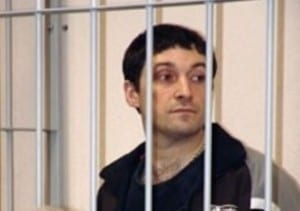Trade unionist Valentin Urusov is proof that in Russia, it’s still possible to be imprisoned in the 21st century equivalent of the gulag for standing up for worker rights on the job. An electrical fitter at an ore-processing mill owned by the diamond mining company Alrosa, Urusov has spent more than four years of a six-year term in a penal colony in Yakutia in far northern Russia.
Described by friends as an intelligent and persuasive leader, Urusov in June 2008 formed the Profsvoboda trade union, affiliated with the Russian Metalworkers Trade Union. Profsvoboda sought to represent workers at the Udachny Pipe Diamond Mine, where workers toil in brutal cold in an open diamond pit just outside the Arctic circle.
Days after the union was founded, workers in one of the mine’s vehicle depots, dissatisfied with low pay and working conditions, announced a hunger strike. Alrosa refused to meet with them and instead unleashed a crackdown against trade union activists. When workers responded by preparing for a large-scale protest rally, Urusov was detained on suspicion of narcotics possession. The company’s deputy director for economic security was “coincidentally” present when the drugs were allegedly found on Urusov, enabling the deputy director to serve as an official witness, which is required under Russian law during police searches.
According to the Russian Confederation of Labor (KTR), which for years has engaged the international labor community in pressing for Urusov’s release, Urusov told his lawyer that the men who arrested him threatened to kill him if he refused to sign a document stating he possessed the drugs. They took him to the woods, and shots were fired near his head. He was beaten with batons and told he should get ready to die. Further, they demanded that Urusov confess that his union deputy had given the packet to him, but Urusov refused to give false testimony against his co-worker. After Urusov’s conviction, a higher court set aside the verdict, finding that there were serious procedural errors in the handling of his case and referred the case back for retrial. But in a retrial, the lower court did not change the verdict. In 2011, Urusov applied for parole and was denied. Urusov, who suffers from chronic kidney disease, remains in prison.
With Urusov behind bars, the KTR says Alrosa continued its campaign to destroy the union. Management representatives threatened union supporters and even those who had applied to join the union. By March 2009, the company fired the last 13 union activists. They appealed their dismissal in court, but lost. Those dismissed failed to find jobs because all enterprises in the city are linked to the Alrosa company.
The KTR filed Urusov’s case with the International Labor Organization (ILO) which in November issued a report requesting the Russian government indicate whether the allegation of anti-union persecution had been investigated. If not, the ILO recommended the government conduct an independent investigation. Russia’s Presidential Council for Civil Society and Human Rights in January sent an appeal signed by journalists, human rights activists and other public figures to Russian President Vladimir Putin urging the government follow the ILO recommendations. A recent Human Rights Watch report harshly criticized Russia’s use of laws to restrict civil society.
Russian trade union activists face many types of workplace harassment, sackings and beatings by company thugs. But this is the first time in recent years, trade union activity has been “punished” with a lengthy jail sentence.

